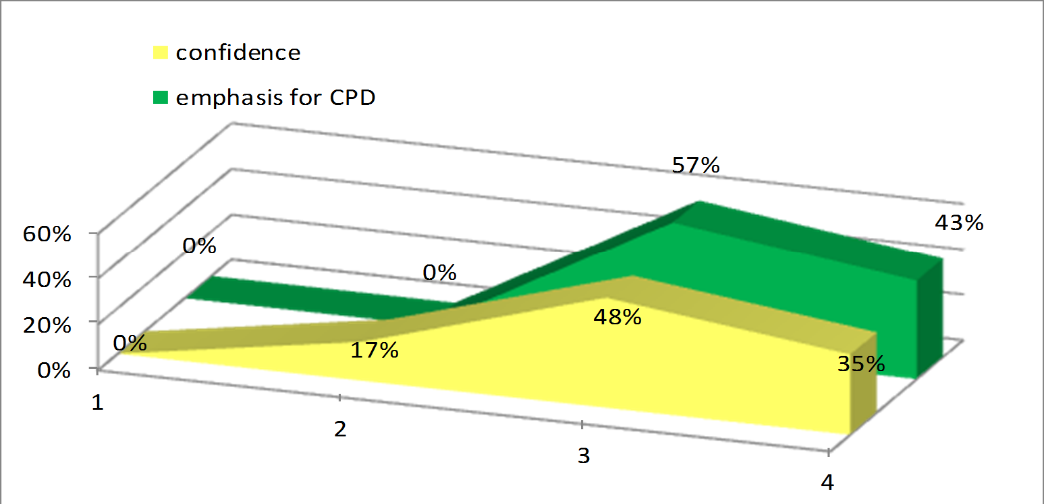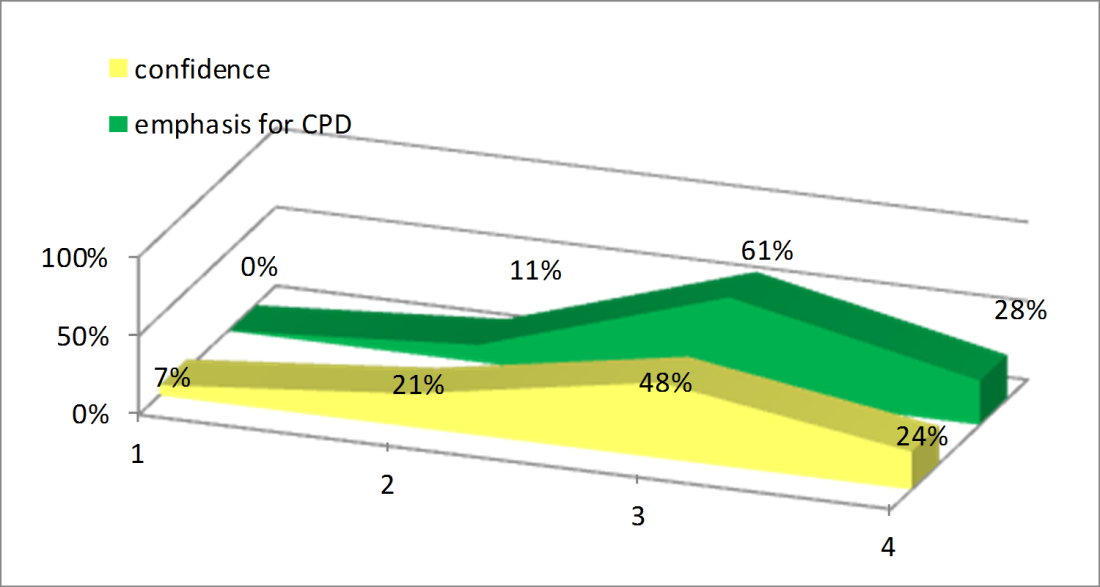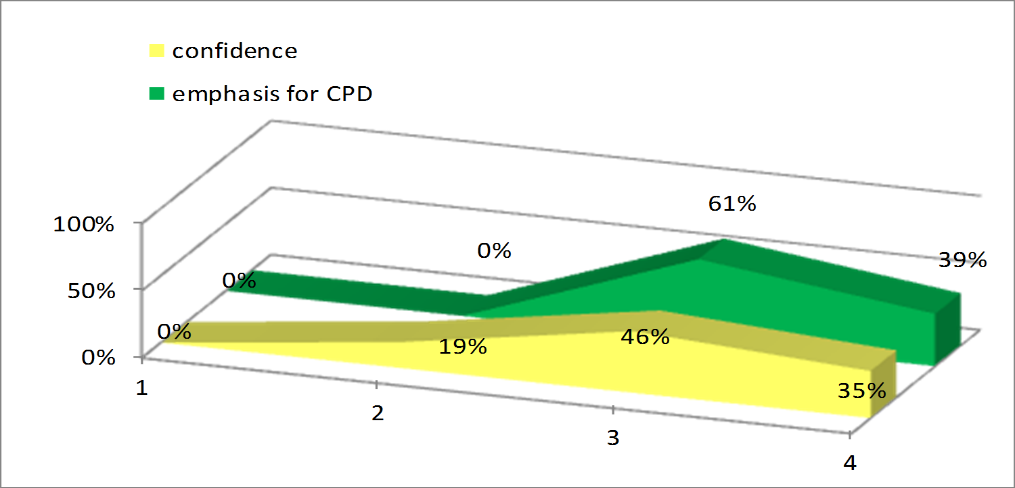Abstract
The focus of the PROFILES project lies on promoting reflection‐oriented teaching, in order to enhance the students’ scientific literacy. The emphasis is oriented on the promotion of the teachers’ scientific and pedagogical competencies, especially on
Keywords: Science teachersassessmentformative assessment,assessment strategiesPROFILES Project
Introduction
The Training programme dedicated to Science teachers (Physics, Chemistry, Biology) and developed during the FP7 PROFILES, promoted the development of scientific and pedagogical competences of the teachers, by using
We started from the identification of the needs for professional development of teachers participating in the training programme, those needs being the basis of organizing collaborative and interactive meetings, where there were developed IBSE strategies, and starting from here, methods and alternative techniques for students`assessment which are applied in Science lessons.
For students, studying Science (Chemistry, Physics, Biology) is very important, this aiming to the transmission of the basic science concepts and to the development of the competences necessary for an optimum adaptation to the specific requirements of knowledge based society, developing so a positive attitude towards science.
From this point of view, the Science teachers as reflective practitioners, should be concerned by the process of assessmenttoo, which has to support an important restructuring process. Evaluation is a fundamental part of the educational process, it naturally complementing the other two activities, teaching and learning. Due to the complexity and importance in the educational process, the assessment was and is still the subject of numerous studies and analyzes. We present, below, some relevant definitions of assessment.
School assessment is conceived today increasingly more as part of the learning process and being its pole (Abernot, 1996).
Assessment is a "formulation, in a specific purpose, of some judgments on the value of certain ideas, papers, statements, methods, materials" (Bloom, apud Radu, 1999, p. 13).
A. Bonboir (apud Radu, 1999) defines assessment referring to the fact that it implies a value judgment based on precise criteria; it can give rise to a numerical result (grade) or grade (classification of the students in classroom, setting known content elements).
The assessment is not only a final point in the educational process, but it has to become an integral part of the process, able to provide to teachers and students the necessary feed-back to improve their activity during the educational process. In this way, the assessment gets a special importance in modern science lessons.
Problem Statement
The assessment issue is extremely important for a quality educational process. Over time, assessmentsuports major developments from both theoretical and practical points of view and today the assessmenthas multiple functions in educational system, in educational process and in the relation between school and society.
In the present study we are interested in analyzing the assessment process from the perspective of Science teachers: issues related to positive feed-back, using portfolios as alternative assessment method, using various types of items in the preparation of the assessment tests, in order to identify different levels of student's thinking.
Evolving from the traditional view, in which the assessment stood at the end of learning, now the assessment process is seen no longer as a parallel activity to the learning process, but rather one that intertwines with teaching and learning, and creates interactive and circular relations with them (Savu-Cristescu, 2014).
By organizing and directing actions of the students` learning activity, the teacher performs multiple processes of knowledge, appreciation and valuing learning, that they serve to make decisions on their own work, on their own teaching activity.
Today we can talk about two directions of evolution of assessment, possible and necessary at the same time: one in the field of assessment strategies and the other in the fieldof the assessment methods.
The first evolution direction is related to assessment strategies. In this context, the formative assessment strategy became a very important strategy.
Unlike other assessment strategies (initial assessment and summative assessment), formative assessment is designed to inform teachers about student progress and, therefore, is an integral part of the educational process at the micro-level.
The formative assessment is an on-going process, an informing process, involving both teachers and students, and highlights progress on all aspects of educational demarche, and the degree to which students are ready for new challenges.
Formative assessment provides relevant data concerning the pace and style of learning, being oriented towards meeting the needs of students.
In the formative strategy, the assessment is seen as a form of aid, so teacher has theresponsibility“to provide student’s feedback to help him/her in present - identifying areas of strengths and weaknesses, giving suggestions on what to study or how to improve some aspects, showing what habits are productive and what habits aren’t productive, showing what can be expected from future assessments etc.” (Gardner, 2006).
The second evolution direction is related to the assessment methods.In this field,it occurs significant changes, because, in addition to traditional assessment methods (oral test, written test and practical test), the complementary/alternative assessment methods bring additional and relevant information, that complement those obtained by classical methods.
We refer here to some of the alternative, complementary assessment methods, that can be successfully used in Science lessons: portfolio, investigation, project.
Through the projects, portfolios, investigations carried out in the lessons of Sciences, the student can demonstrate capacity to assert its own personality, its own profile of intelligence and value judgment issued by the teacher, on its results, objective and relevance (Gorghiu, & Drăghicescu, 2014).
Research Questions
Two research questions were coming related to the assessment process in Science lessons:
What are the perceptions of the Science teachers about the assessment process and its role in the educational process?
(b) What are the best assessment strategies and methods which can be used in the Science lessons?
Purpose of the Study
In the beginning of the PROFILES project(http://www.profiles-project.eu/, http://profiles.ssai.valahia.ro), we conducted an investigation about teachers needs related to introduce a continuous professional development program.
The study aimed to investigate the science teachers’ perception concerning the importance of the assessment in the educational process, from two different perspectives: the teachers’ confidence about certain aspects of the assessment, and the emphasis to integrate such issues within the program of professional development.
Research Methods
As research method, we used a survey questionnaire – developed in the frame of the project -, administrated to 100 Sciences teachers (Physics, Chemistry, Biology) from pre-university education.
The items were designed in some different categories like: goals of education, inquiry-based science education, students’ motivation, classroom learning environment, self-reflection, assessment. In the present paper we present and analyzethe obtained data about the importance of the
The items were structured into two assessment scales, with four steps each, the first one concerning the confidence of the teachers about certain aspects of the learning environment (column A), and the second one regarding the emphasis for CPD (continuous professional development program), the need to integrate such issues in professional development program (column B). The scale degrees for the confidence were: 4 - very well, 3 - well, 2 - satisfactorily, 1 - do not know, and for emphasis for CPD were: 4 - very necessary, 3 - necessary, 2 - rather not, 1 - definitively not (Holbrook, Rannikmäe, & Valdmann, 2014).
The processing of the results was mostly statistical, in correlation withthe qualitative analysis, based on the data gathered from discussions with the involved teachers.
In ourstudywe made a comparative analysis of the resultsfrom the twomentionedperspectives : confidence and emphasis for CPD. Wechoosethreerelevants items from the assesmentcategory.
Findings
The first item that we analyze refers to providing positive feedback to all students. This is an important aspect in the assessment process.
Giving feedback is equally important for all students, both for those who register good results (to have the teacher confirmation that they correctly solved the tasks or that learning strategies they used were appropriate), but also for students who have less good results (for awareness and correcting mistakes). Thus, through the feed-back provided in the formative evaluation strategy, the entire educational process can be adjusted and improved during the designed activity.

In figure
The second item analyzed in the present study refers to the assessment of the acquired knowledge, skills and competences of students, through individual portfolios.
In Science lessons, using portfolios as an alternative assessment method can provide important and relevant data about the student’s progress, about the degree of fulfillment of different educational goals.
A portfolio is a complex and longitudinal assessment method, projected for a longer period, that provides the opportunity to present a value judgment based on a set of student’s results. This tool is a collection of student’s work products (Cucoş, 2008).

The percentages obtained for this item shows that Science teachers realized the importance of using portfolio as alternative assessment method, but also highlighted the need for information and training related to the proposed subject.
Another item selected refers to using various types of items in the preparation of assessment tests to identify different levels of student’s thinking.
The quality of a test depends on the quality of the items. There are several categories of items that can be used: (a) objective items (dual choice items, multiple choice items, association items), (b) semi- objective items (with short answers, completion items and structured questions items), and (c) subjective items (problem solving and essay items) (Radu, 1999).
It is very important when a test is designed - depending on its purpose - to opt for the most relevant categories and subcategories of items. The items can be at different levels of difficulty, ones aiming just on making appeal to students’ knowledge, others aiming to different level of thinking operations.

In the perception of Science teachers, the confidence on using various type of items in the tests is seen as good and very good (46% and 35 %). The teachers consider necessary and very necessary to integrate such subjects in a professional development program (61% and 39%).
Conclusion
Our results lead to the following conclusions, as responses to the research questions: science teachers consider that they have to pay more attention in assessment process and they need to use, in sciences lessons, modern assessment strategies (like formative assessment) and modern/alternative assessment methods (like portofolios), in parallel with classical strategies and methods.
The teachers sometimes feel insufficiently trained to implement certain assessment practices (using a wide range of strategies for evaluating the skills; adoption of a palette of formative assessments, based on the students’ particularities, providing positive feedback to all students, assessing students skills through individual portfolios, using various types of items in the preparation of the assessment tests to identify different levels of student thinking), so they want to know more about those issues.
Acknowledgments
This work was funded through the Seventh Framework Programme “
References
- Abernot, Y. (1996). Les methodes d`evaluation scolaires. Paris: DUNOD Publishing.
- Cucoş, C. (2008). Teoria şi metodologia evaluării. Iaşi: EdituraPolirom.
- Gardner, H. (2006). Inteligenţe multiple. Noi orizonturi. Bucureşti: Editura Sigma.
- Gorghiu, G.,Drăghicescu, L. M. (2014). Educaţie prin Ştiinţe. Aspecte referitoare la instruirea bazată pe investigaţie ştiinţifică. Târgovişte: Editura Bibliotheca.
- Holbrook, J., Rannikmäe, M., & Valdmann, A. (2014). Identifying teacher needs for promoting Education through Science as a paradigm shift in Science Education. Science Education International, 25(2), 4-42.
- Radu, I. T. (1999). Evaluarea în procesul didactic.Bucureşti: Editura Didactică și Pedagogică.
- Savu-Cristescu, M. (2014).Teoria și practica evaluării.Târgoviște: Valahia University Press.
Copyright information

This work is licensed under a Creative Commons Attribution-NonCommercial-NoDerivatives 4.0 International License.
About this article
Publication Date
30 July 2017
Article Doi
eBook ISBN
978-1-80296-026-6
Publisher
Future Academy
Volume
27
Print ISBN (optional)
-
Edition Number
1st Edition
Pages
1-893
Subjects
Teacher training, teaching, teaching skills, teaching techniques,moral purpose of education, social purpose of education, counselling psychology
Cite this article as:
Stăncescu, I., & Drăghicescu, L. M. (2017). The Importance Of Assessment In The Educational Process - Science Teachers’ Perspective. In A. Sandu, T. Ciulei, & A. Frunza (Eds.), Multidimensional Education and Professional Development: Ethical Values, vol 27. European Proceedings of Social and Behavioural Sciences (pp. 753-759). Future Academy. https://doi.org/10.15405/epsbs.2017.07.03.89

